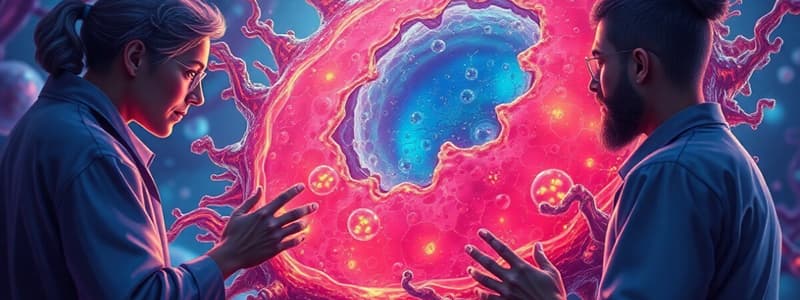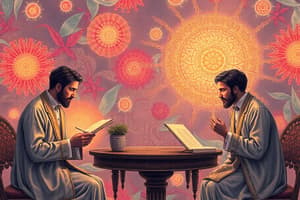Podcast
Questions and Answers
What term did Robert Hooke coin during his observations of cork?
What term did Robert Hooke coin during his observations of cork?
- Cell (correct)
- Animalcule
- Microscope
- Bacteria
Which scientist is known for teaching himself to make lenses and inventing early microscopes?
Which scientist is known for teaching himself to make lenses and inventing early microscopes?
- Robert Hooke
- Louis Pasteur
- Albert Einstein
- Anton van Leeuwenhoek (correct)
What did Anton van Leeuwenhoek refer to the microorganisms he observed in rainwater?
What did Anton van Leeuwenhoek refer to the microorganisms he observed in rainwater?
- Animalcules (correct)
- Bacteria
- Protozoa
- Cells
In which way did Robert Hooke observe cells?
In which way did Robert Hooke observe cells?
What notable observation did Anton van Leeuwenhoek make in his experiments?
What notable observation did Anton van Leeuwenhoek make in his experiments?
What is one characteristic that both Robert Hooke and Anton van Leeuwenhoek shared in their contributions to biology?
What is one characteristic that both Robert Hooke and Anton van Leeuwenhoek shared in their contributions to biology?
Which observation is NOT attributed to Anton van Leeuwenhoek?
Which observation is NOT attributed to Anton van Leeuwenhoek?
What is Rudolf Virchow's major contribution to cell theory?
What is Rudolf Virchow's major contribution to cell theory?
Which statement is NOT one of the original tenets of cell theory?
Which statement is NOT one of the original tenets of cell theory?
Who is credited with beginning the scientific study of cells?
Who is credited with beginning the scientific study of cells?
How are cells generally viewed in the context of modern cell theory?
How are cells generally viewed in the context of modern cell theory?
What does the phrase 'Omnis cellula e cellula' imply?
What does the phrase 'Omnis cellula e cellula' imply?
What significant technological advancement helped in the discovery of cells in the 17th century?
What significant technological advancement helped in the discovery of cells in the 17th century?
Which of the following statements reflects a misunderstanding of cell theory?
Which of the following statements reflects a misunderstanding of cell theory?
What does modern cell theory emphasize about genetic material in cells?
What does modern cell theory emphasize about genetic material in cells?
Who is credited with introducing the concept of Brownian movement?
Who is credited with introducing the concept of Brownian movement?
What significant contribution did Theodor Schwann make to cell theory?
What significant contribution did Theodor Schwann make to cell theory?
What is Sarcode, as discovered by Felix Dujardin?
What is Sarcode, as discovered by Felix Dujardin?
What did Robert Remak dispute about Schleiden's hypothesis?
What did Robert Remak dispute about Schleiden's hypothesis?
Which scientist was a co-founder of cell theory along with Theodor Schwann?
Which scientist was a co-founder of cell theory along with Theodor Schwann?
Which scientist identified nuclei in plant cells?
Which scientist identified nuclei in plant cells?
What was Henri Joachim Dutrochet's contribution to the understanding of cells?
What was Henri Joachim Dutrochet's contribution to the understanding of cells?
Which of the following accurately describes the findings of Matthias Jakob Schleiden?
Which of the following accurately describes the findings of Matthias Jakob Schleiden?
Study Notes
Cell Theory Contributors & Discoveries
- Robert Hooke (1635-1703): Coined the term "cell" after observing compartments in cork; used an early compound microscope to examine plant tissue.
- Anton van Leeuwenhoek (1632-1723): Developed his own microscope and observed "animalcules" (bacteria and protozoa); documented microscopic observations of various biological structures, including muscle fibers, spermatozoa, and red blood cells.
- Robert Brown (1773-1858): Identified the nucleus in plant cells; described Brownian movement.
- Felix Dujardin (1801-1860): Discovered sarcode (later called protoplasm), the living substance within cells.
- Matthias Schleiden (1804-1881): Concluded that all plants are made of cells; a co-founder of cell theory.
- Theodor Schwann (1810-1882): Extended cell theory to animals; another co-founder of cell theory.
- Henri Dutrochet (1776-1847): Proposed the cell as both a structural and physiological unit of life.
- Rudolf Virchow (1821-1902): Provided evidence that new animal cells arise from pre-existing cells via binary fission; stated "Omnis cellula e cellula" ("all cells from cells"); his work is a cornerstone of cell theory.
- Robert Remak (1815-1865): Contributed to the understanding of cell division and disputed Schleiden's hypotheses on cell formation.
Cell Theory: Classical and Modern Postulates
-
Classical Cell Theory:
- All living organisms are composed of one or more cells.
- The cell is the basic unit of structure and organization in organisms.
- Cells arise from pre-existing cells.
-
Modern Cell Theory: Includes the classical postulates and adds:
- All living organisms are composed of trillions of cells. (Elaboration on the first postulate)
- Cells contain genetic material passed from generation to generation.
- Cell is the fundamental building block of all living organisms
Key Concepts
- Cells exhibit the characteristics of life.
- Cell biology is the scientific study of cells.
Studying That Suits You
Use AI to generate personalized quizzes and flashcards to suit your learning preferences.
Related Documents
Description
Test your knowledge on the key contributors to Cell Theory and their groundbreaking discoveries in biology. Learn about the pivotal roles played by scientists like Hooke, Leeuwenhoek, and Schleiden in understanding cellular structure and function.




